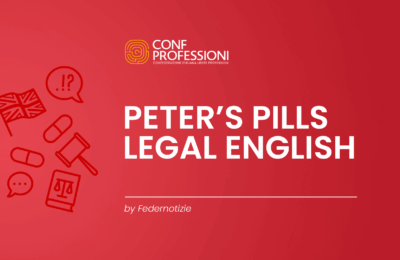“Peter’s Pills” è la rubrica online di Legal English curata da Federnotizie, in collaborazione con Confprofessioni e Beprof.
In questa video-lezione parliamo di “False Friends“. I “Falsi Amici” sono termini inglesi che somigliano a parole italiane, ma hanno significati diversi, pertanto possono creare ambiguità e possibili errori nella traduzione. Comprendere i False Friends è fondamentale per migliorare la padronanza del Legal English, evitando fraintendimenti in testi giuridici e documenti professionali. Scopri di più su come riconoscerli e usarli correttamente!
La video-lezione è disponibile anche su Federnotizie e sull’app Beprof, scaricabile gratuitamente da App Store e Google Play.
False Friends (Part Two)
Transcript:
Hello!
Today we continue to look at some more false friends which are often found in Legal English but which may trick you if your are not careful. Last week we looked at 1 to 5 , and this week we continue with 6 to 10.
6. Injunction ≠ Ingiunzione
In English, an injunction is a court order generally requiring someone not to do something, and occasionally requiring someone to do something (diffida). In Italian, ingiunzione usually refers to a payment order (e.g. ingiunzione di pagamento)—a different concept.
- The court issued an injunction (diffida) stopping the sale of the disputed land;
- An injunction (inibitoria) was sought (sollecitata) to prevent the company from transferring its assets abroad.
Be careful: ingiunzione = payment order; an injunction = to prevent or stop actions that would cause irreparable harm or injustice.
7. Intestate ≠ Intestato
In English, intestate means having died without a valid will (testamento). In Italian, intestato usually refers to a property or asset being registered in someone’s name.
- She died intestate (senza valido testamento), so the estate (asse ereditario) was distributed according to intestacy rules;
- If someone dies intestate (senza testamento), their heirs are determined by law, not by will.
Be careful: intestato means registered in the the name (of); intestate means to die without a will.
8. Location ≠ Locazione
Location in English refers to the place or position of something. Locazione in Italian is a legal term for a lease or rental agreement.
- The exact location (ubicazione) of the property must be included in the sale agreement;
- The location (ubicazione) of the company’s registered office is specified in the memorandum.
Be careful: locazione = rental contract (i.e. lease); location = physical place or position.
9. Notice ≠ Notizia
In legal English, notice is a formal act of giving information, often with legal effect (e.g. termination of a contract). Notizia in Italian simply means news or information, not a formal legal communication.
- The buyer gave written notice (comunicazione) to the seller about the breach (violazione) of contract;
- A three-month notice period (preavviso) is required to terminate the agreement.
Be careful: notizia = news; notice = comunicazione or preavviso.
10. Doctrine ≠ Dottrina
Doctrine in English refers to a legal principle or rule established by courts or legal systems. Dottrina in Italian refers to academic commentary or scholarly opinion, not binding principles.
- The judge explained the doctrine (principio di legge) that a contract needs an offer, acceptance, intention and consideration;
- We learned the basic doctrines (principi di legge) of English land law in our first year at law school.
Be careful: Dottrina = scholarly opinion = Doctrine = principle of law.
Thank you very much and see you next time for more Peter’s Pills to improve your Legal English!


